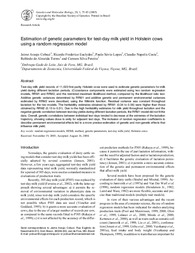Estimation of genetic parameters for test-day milk yield in holstein cows using a random regression model.
Estimation of genetic parameters for test-day milk yield in holstein cows using a random regression model.
Author(s): COBUCI, J. A.; EUCLYDES, R. F.; LOPES, P. S.; COSTA, C. N.; TORRES, R. de A.; PEREIRA, C. S.
Summary: Test-day milk yield records of 11,023 first-parity Holstein cows were used to estimate genetic parameters for milk yield during different lactation periods. (Co)variance components were estimated using two random regression models, RRM1 and RRM2, and the restricted maximum likelihood method, compared by the likelihood ratio test. Additive genetic variances determined by RRM1 and additive genetic and permanent environmental variances estimated by RRM2 were described, using the Wilmink function. Residual variance was constant throughout lactation for the two models. The heritability estimates obtained by RRM1 (0.34 to 0.56) were higher than those obtained by RRM2 (0.15 to 0.31). Due to the high heritability estimates for milk yield throughout lactation and the negative genetic correlation between test-day yields during different lactation periods, the RRM1 model did not fit the data. Overall, genetic correlations between individual test days tended to decrease at the extremes of the lactation trajectory, showing values close to unity for adjacent test days. The inclusion of random regression coefficients to describe permanent environmental effects led to a more precise estimation of genetic and non-genetic effects that influence milk yield.
Publication year: 2005
Types of publication: Journal article
Unit: Embrapa Dairy Cattle
Keywords: Gado Holandês, Parâmetro Genético, Produção Leiteira
Observation
Some of Embrapa's publications are published as ePub files. To read them, use or download one of the following free software options to your computer or mobile device. Android: Google Play Books; IOS: iBooks; Windows and Linux: Calibre.
Access other publications
Access the Agricultural Research Database (BDPA) to consult Embrapa's full library collection and records.
Visit Embrapa Bookstore to purchase books and other publications sold by Embrapa.

